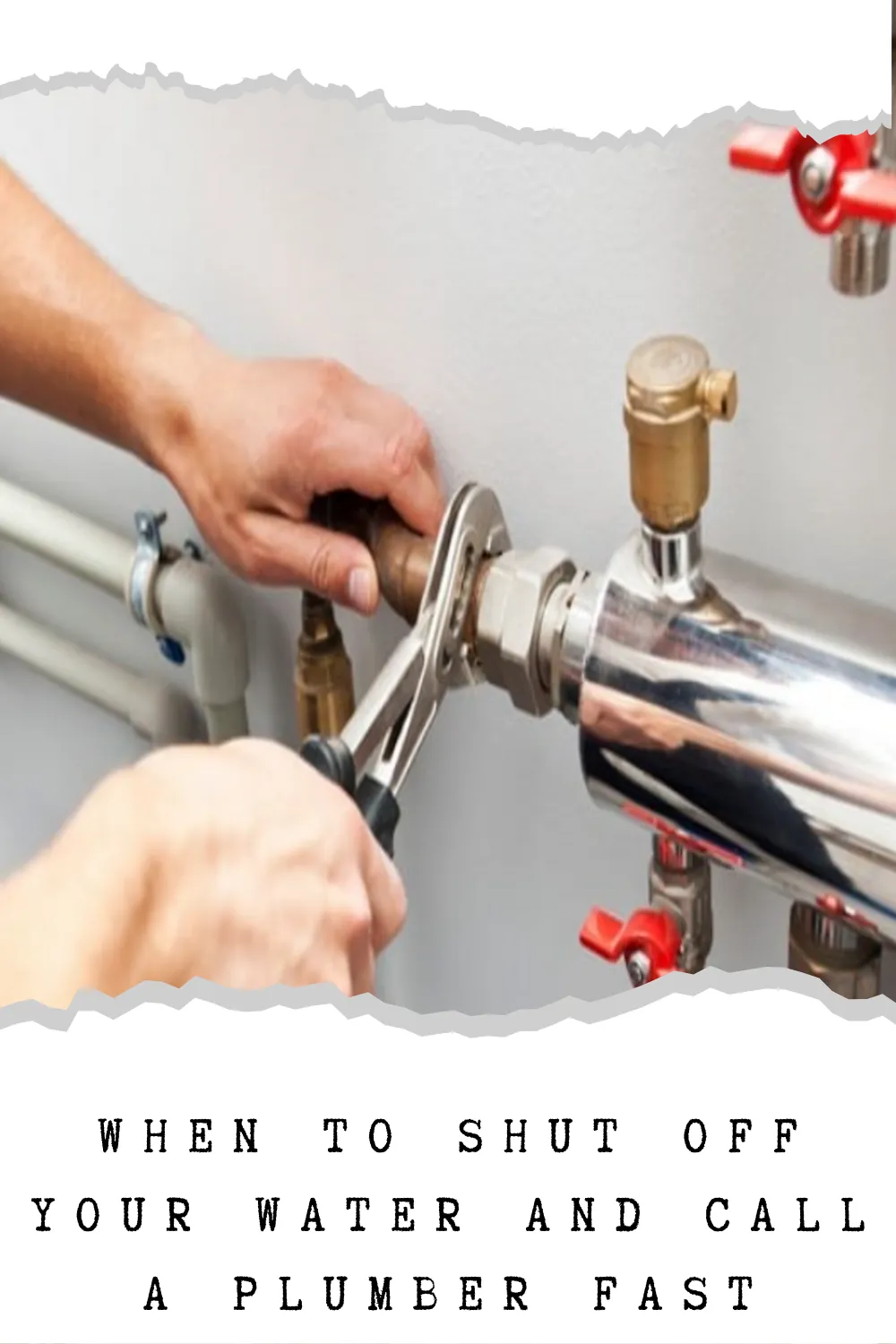
When to Shut Off Your Water and Call a Plumber Fast
Knowing when to shut off your water isn’t just about stopping a leak — it’s about protecting your home, your budget, and your peace of mind. - Appliane Boss
Introduction: Why Acting Fast Can Save Your Home and Wallet
Water can be both a life essential and a destructive force. When a pipe bursts or a fixture fails, every passing second allows gallons of water to flood your floors, soak your walls, and ruin your belongings. Acting fast isn’t just smart—it’s critical. Swift action during a plumbing emergency can mean the difference between a quick repair and thousands of dollars in restoration costs.
Understanding the Importance of Quick Action During Plumbing Emergencies
Plumbing issues often escalate in minutes. What begins as a small leak can quickly saturate drywall, short electrical systems, and invite dangerous mold growth. Taking immediate action—especially shutting off your water—helps minimize both structural and financial damage.
How Knowing When to Shut Off Your Water Can Prevent Thousands in Damage
A single burst pipe can release up to 100 gallons of water in just eight hours. By shutting off your main valve as soon as you spot a problem, you halt the flow and protect your home’s foundation, flooring, and electrical systems. Quick action saves not only your property but also your peace of mind.

Recognizing a Plumbing Emergency Before It’s Too Late
Sometimes, plumbing disasters give subtle warnings before striking. Recognizing these signs early can save you from chaos.
Signs That Your Plumbing Problem Needs Immediate Attention
If you hear hissing, dripping, or see unexpected moisture, don’t ignore it. Unusual odors, reduced water pressure, or rapidly climbing water bills also indicate leaks or ruptures needing fast intervention.
How to Tell the Difference Between a Minor Issue and a Full-Blown Crisis
A slow drip from a faucet can wait until morning. But water gushing from a pipe, a non-stop toilet overflow, or water pooling near electrical outlets requires immediate shut-off and professional help.
Why Every Homeowner Should Know Their Water Shut-Off Valve
Your main water shut-off valve is your home’s first line of defense against water disasters.
What a Main Water Shut-Off Valve Is and How It Works
This valve controls the flow of water from the municipal line into your home. Turning it clockwise cuts the supply, stopping water at its source until repairs can be made.
How to Locate Your Home’s Main Shut-Off Valve Quickly
In most homes, the valve is located near the perimeter wall, close to where the main line enters—often in basements, garages, or utility rooms. In warmer climates, it may be outside, attached to an exterior wall or near a water meter box.
Pro Tip: Labeling Your Shut-Off for Fast Access in an Emergency
Attach a bright tag or label to your shut-off valve so everyone in your household can find it fast. In an emergency, every second matters.
Common Situations That Require You to Shut Off the Water Immediately
Plumbing emergencies come in many forms. Knowing when to act can save you major headaches.
When a Pipe Bursts and Water Is Pouring Out
A burst pipe is one of the most urgent plumbing crises. Shut off your main valve instantly to stop flooding and call a plumber for immediate repair.
When Your Toilet Is Overflowing and Won’t Stop
If your toilet won’t stop running or begins to overflow, turn off the water supply valve located behind it. This quick move prevents sewage backups and bathroom flooding.
When Your Water Heater Starts Leaking or Steaming
A leaking or hissing water heater could mean excessive pressure or internal failure. Shut off both the water and power supply right away to avoid explosions or scalding leaks.
When Your Sink or Tub Won’t Stop Running Despite Turning the Handle
If your faucet won’t stop, it might be a faulty valve inside. Turn off the under-sink shut-off to prevent continuous water waste while you wait for repair.
Leaking Pipes: When a Drip Turns Dangerous
A steady drip can erode drywall, warp wood, and invite black mold.
How Small Leaks Can Lead to Major Water Damage Over Time
Even a minor leak can saturate insulation and weaken structural materials. Left unchecked, it can cause costly hidden damage that spreads quietly through your home.
When Shutting Off the Water Can Save Your Home’s Structure and Foundation
If you notice moisture around your foundation or under floors, shut off the water to stop seepage before it compromises your home’s structural integrity.
Frozen Pipes: A Hidden Threat in Cold Weather
When water freezes inside pipes, it expands and creates internal pressure, often leading to splits or ruptures.
How Freezing Temperatures Cause Pipes to Burst
Cold air causes water molecules to expand as they solidify, straining metal and PVC pipes until they crack.
What to Do Before and After Shutting Off the Water
Before winter, insulate exposed pipes and keep faucets slightly open to prevent freezing. If a pipe bursts, shut off water immediately, open nearby taps, and call a plumber.
Major Water Leaks and Flooding in Your Home
Flooding can happen fast and destroy floors, furniture, and wiring.
Identifying Where Leaks Are Coming From and How to React
Look for dripping ceilings, bubbling paint, or soft spots in floors. Once identified, shut off the water and power supply to avoid electric shock.
Steps to Safely Shut Off Water and Reduce Further Damage
Turn the main valve clockwise, unplug electronics, and move valuables away from affected areas. Use towels or a wet vac to limit damage before help arrives.
When Your Water Heater Becomes a Hazard
Your water heater may fail silently, then suddenly cause significant trouble.
Signs of Water Heater Failure You Shouldn’t Ignore
Rusty water, strange noises, or water pooling beneath the tank are all warning signs.
Why Shutting Off the Water and Power Can Prevent Dangerous Pressure Buildup
Shutting down the water and electrical power reduces the risk of explosions, overheating, or scalding leaks from a malfunctioning heater.
When to Shut Off Water After a Sewer Backup
A sewer backup is not only inconvenient—it’s a biohazard.
How to Recognize a Sewer Backup Before It Worsens
Slow drains, foul odors, or gurgling toilets indicate sewage flow reversal.
Why Quick Shut-Off and Cleanup Are Essential for Health and Safety
Cutting water flow prevents more waste from entering your home, minimizing contamination and potential illness.
When a Broken Appliance Becomes a Plumbing Emergency
Modern appliances connect directly to your water lines, meaning leaks can spread fast.
Dishwashers, Washing Machines, and Refrigerators That Won’t Stop Leaking
Water pooling under these appliances signals a ruptured line or loose connection. Shut off their individual supply valves if possible.
How to Shut Off Water Supply to Individual Appliances Before Calling a Plumber
Each appliance usually has a localized shut-off—look behind or underneath. Turning these valves off helps contain the issue while awaiting repairs.
Outdoor Plumbing Problems You Shouldn’t Ignore
Leaks outside your home can still cause major damage.
Sprinkler Line Leaks and Outdoor Faucet Issues
Underground sprinkler lines and outdoor taps can leak unnoticed, wasting water and eroding soil near your foundation.
When to Shut Off Outdoor Water Lines to Prevent Property Damage
Before winter or during repairs, turn off exterior lines to prevent freezing or unnecessary water waste.
The Role of the Water Meter in Emergencies
Your water meter can tell you more than just your usage—it’s a diagnostic tool.
How to Use Your Water Meter to Detect Hidden Leaks
If the meter dial moves when no water is running, there’s likely a hidden leak.
When Turning Off the Meter Supply Line Can Help Isolate the Problem
For major emergencies, shutting off water directly at the meter halts all flow until repairs are complete.
Preventing Water Waste During a Plumbing Emergency
Even in crisis, conserving water matters.
How Quick Shut-Offs Conserve Water and Reduce Utility Bills
Stopping leaks fast saves thousands of gallons and cuts unnecessary costs.
Simple Steps to Act Fast Before Help Arrives
Keep tools, towels, and a flashlight handy near your shut-off valve for quick response.
Safety Tips Before and After Shutting Off Your Water
Protect yourself and your property while waiting for professional help.
Why You Should Always Cut Power to Nearby Electrical Sources
Water and electricity don’t mix—turn off breakers in affected areas to avoid electrocution.
Steps to Safely Dry and Clean Affected Areas Before the Plumber Comes
Open windows, run fans, and remove soaked rugs or furniture to prevent mold growth.
What Happens If You Don’t Shut Off the Water Fast Enough
Delaying response can turn a small leak into a full-blown disaster.
Real-Life Consequences of Water Damage and Mold Growth
Within 48 hours, dampness can breed harmful mold, damaging air quality and your health.
How Delayed Action Increases Repair Costs and Health Risks
What could’ve been a minor fix might evolve into a structural overhaul costing thousands more.
How Professional Plumbers Handle Emergency Situations
Experts arrive prepared with tools, training, and diagnostic technology.
What to Expect When You Call a Licensed Plumber in a Water Emergency
They’ll assess, isolate, and repair issues efficiently—often the same day—to restore your plumbing system safely.
Why Experts Can Locate and Fix the Root Cause Faster Than DIY Attempts
While temporary DIY fixes may hold briefly, professionals ensure lasting, code-compliant solutions that prevent recurrence.
The Best Time to Call a Plumber — Even If the Water Is Off
Once you’ve controlled the situation, don’t delay professional inspection.
How to Decide If the Issue Requires Same-Day or Scheduled Service
Major leaks, loss of water pressure, or flooding demand urgent service. Minor drips may wait—but don’t postpone too long.
Why Calling a Plumber Early Can Prevent Repeat Breakdowns
A quick repair today can prevent future emergencies and save on utility costs long-term.
Tips to Prevent Future Water Emergencies in Your Home
Prevention is your strongest defense.
Installing Water Sensors and Automatic Shut-Off Systems
Smart sensors detect leaks instantly and cut water flow before damage escalates.
Routine Maintenance Checks That Protect Your Plumbing System Year-Round
Regular inspections, cleaning, and replacing worn-out fittings keep your system resilient and efficient.
Preparing Your Family for Plumbing Emergencies
Everyone should know what to do when water starts to flow unexpectedly.
Creating a Quick-Access Plan for Shutting Off Water
Keep a clear map or label for valves so even kids or guests can act fast in an emergency.
Teaching Everyone in the Household What to Do During Leaks or Floods
Assign simple tasks: one shuts off water, another grabs towels, another calls for help. Teamwork saves time and property.
Conclusion: Be Prepared, Stay Calm, and Act Fast
A plumbing emergency doesn’t have to mean panic. Knowing when and how to shut off your water keeps your home safe, your repairs minimal, and your family calm. Quick action, combined with professional expertise, makes all the difference.
For fast, dependable plumbing help in Bakersfield, contact Zip Does Plumbing at (661) 370-2701 or visit www.zipdoesplumbing.com. Our licensed experts are ready to respond quickly, fix your plumbing issues right the first time, and keep your home protected year-round.
